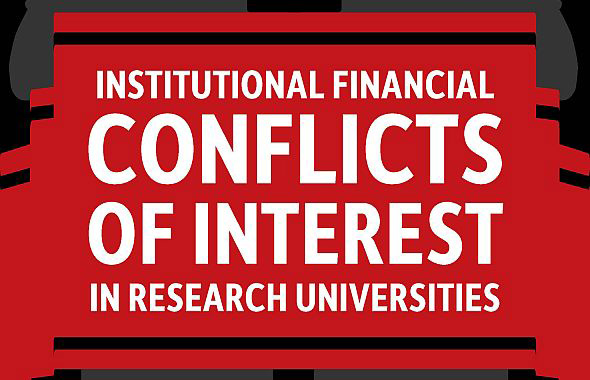Institutional Financial Conflicts of Interest in Research Universities

Conference Overview
Following the turn of the twenty-first century and the burst of the “IT Bubble,” we have seen the collapse of large publicly traded firms like Enron and WorldCom, as well as their auditing firm, Arthur D. Anderson. Soon after, in 2008, the financial crash led to the collapse of Bear Stearns, Merrill Lynch, Countrywide, and many others. These events cumulatively heightened awareness of the great public hurt that can result from institutional and individual financial conflicts of interest (fCOIs). In the scientific community, however, these issues have been percolating for decades.
In the 1970s and 80s, widely publicized scandals resulted from research misconduct committed by university scientists, some of whom had fCOIs. The research was supported by federal agencies, primarily the National Institutes of Health (NIH). The scandals attracted harsh congressional attention and mandates that led to the first federal regulations directed at research misconduct, and soon after, at individual fCOIs. Both regulations were initially issued by the US Public Health Service (in which the NIH sits), followed closely by the National Science Foundation (NSF); these two agencies are the largest funders of university research in the biomedical, natural, behavioral, and social sciences.
In the latter 1990s, the Department of Health and Human Services (DHHS) Office of the Inspector General (OIG) and the now-named Government Accountability Office (GAO) sharply questioned the trustworthiness of research universities as stewards of federal research funds and overseers of the research, especially research that involved human subjects, when the institutions themselves increasingly had financial interests in research conducted by their faculty scientists. This was the first time the federal government had expressed concerns about institutional fCOIs in research universities and academic medical centers.
These concerns have only intensified in the ensuing years as research universities have been exhorted with increasing urgency to become ever more deeply engaged with industry in accelerating the translation of their faculties’ inventive research into tangible public benefits. Defining, let alone mitigating, institutional fCOIs in research universities becomes especially challenging as the institutions, in response to expanding and intensifying public expectations, progressively accrete missions that may themselves not be concordant.
This Symposium, organized by Professor David Korn and co-sponsored by the Petrie-Flom Center for Health Law Policy, Biotechnology, and Bioethics at Harvard Law School and Edmond J. Safra Center for Ethics at Harvard University, was intended to examine, clarify, and deepen our understanding of institutional fCOIs in the contemporary research university, and thereby help to identify effective measures that will ensure the continuing trustworthiness of these vital institutions.
Excerpted from the conference report.
Conference Schedule
Welcome
- I. Glenn Cohen, The Petrie-Flom Center for Health Law Policy, Biotechnology, and Bioethics
- Lawrence Lessig, Edmond J. Safra Center for Ethics
Introduction and Overview
David Korn, Massachusetts General Hospital; Harvard Medical School
Panel 1, Evolving Roles, Enduring Values, and Conflicting Public Expectations of American Research Universities
- Jonathan Cole, Columbia University: “A Quest for Utopia: The Great American University Yesterday, Today, and Tomorrow”
- William (Terry) Fisher, Harvard Law School: “The University’s Capacity for Attestation”
- Ezekiel Emanuel, University of Pennsylvania: “An Ethical Perspective on Institutional Financial Conflicts of Interest”
Panel 2, Institutional Conflicts of Interest in Practice, Part I
- Derek Bok, Harvard University: “Investing in Faculty Start-Ups and Other Adventures”
- Jonathan Marks, Penn State: “The Olivieri Case: Institutional Financial Conflicts Perspectives”
Afternoon Welcome
Martha L. Minow, Harvard Law School
Panel 3, Institutional Conflicts of Interest in Practice, Part II
- Claude Canizares, Massachusetts Institute of Technology: “Walking the Tightrope: Protecting Trustworthiness While Engaging with Industry at MIT”
- Hunter Rawlings, Association of American Universities: “The Lion in the Path: Research Universities Confront Society’s New Expectations”
Panel 4, Institutional Financial Conflicts of Interest in Awardee Institutions
- Sally Rockey, National Institutes of Health: “Managing Financial Conflicts of Interest in an Expanding World of Industry-Academia Collaborations in Science and Medicine”
- Julie Taitsman, US Department of Health and Human Services (DHHS), Office of the Inspector General (OIG): “The Perspective of the DHHS OIG”
Concluding Session
- Charles Vest, National Academy of Engineering (Rapporteur)
- Lawrence Bacow, President Emeritus, Tufts University (Co-Rapporteur)
Sponsored by Edmond J. Safra Center for Ethics at Harvard University and the Petrie-Flom Center, with support from the Oswald N. de Cammann Fund.
The final conference report is now available for download.